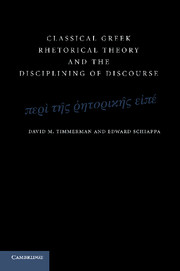Book contents
- Frontmatter
- Contents
- Acknowledgments
- 1 INTRODUCTION: Terms of Art as a Focus in the History of Rhetorical Theory
- 2 DIALEGESTHAI AS A TERM OF ART: Plato and the Disciplining of Dialectic
- 3 PHILOSOPHIA AS A TERM OF ART: Recovering Isocrates
- 4 TERMS OF ART FOR PUBLIC DELIBERATION: Dēmēgoria and Symboulē
- 5 TERMS OF ART AND THE INTERPRETATION OF TEXTS: The Disciplinary Status of the Rhetoric to Alexander
- 6 TERMS OF ART AND INFERRING THEORY: When Did the Parts of a Speech Become Formalized?
- 7 EPILOGUE
- References
- Index
6 - TERMS OF ART AND INFERRING THEORY: When Did the Parts of a Speech Become Formalized?
Published online by Cambridge University Press: 06 July 2010
- Frontmatter
- Contents
- Acknowledgments
- 1 INTRODUCTION: Terms of Art as a Focus in the History of Rhetorical Theory
- 2 DIALEGESTHAI AS A TERM OF ART: Plato and the Disciplining of Dialectic
- 3 PHILOSOPHIA AS A TERM OF ART: Recovering Isocrates
- 4 TERMS OF ART FOR PUBLIC DELIBERATION: Dēmēgoria and Symboulē
- 5 TERMS OF ART AND THE INTERPRETATION OF TEXTS: The Disciplinary Status of the Rhetoric to Alexander
- 6 TERMS OF ART AND INFERRING THEORY: When Did the Parts of a Speech Become Formalized?
- 7 EPILOGUE
- References
- Index
Summary
Charting the early history of rhetorical theory in classical Greece is a difficult task. Oratory, or rhetorical practice, was obviously a significant part of Greek, especially Athenian, culture. It is also clear that, beginning in the fifth century bce, pedagogy that included the production of arguments and speeches became increasingly important and relevant. Although we can now identify such pedagogy as “rhetorical” with the benefit of hindsight, it is not entirely clear when rhetorical pedagogy was recognized and labeled as such, or when it became distinct from pedagogy aimed in general at producing active and able citizens. As we have contended, logos-pedagogy is not necessarily reducible to rhetorical pedagogy, and the introduction in the early fourth century bce of the word rhētorikē changed the manner in which pedagogy and theories of discourse were understood. In this chapter, we want to extend our analysis by calling into question a particular method of inferring rhetorical theory from the rhetorical practices of a particular period of time.
This chapter is motivated in part by Stephen Usher's (1999) Greek Oratory: Tradition and Originality, which claims that the status of Greek rhetorical theory and pedagogy can be inferred by the regular appearance of certain “schemes of oratorical division” (2). Such schemes include the prooemium, prothesis, diagesis (narrative), pistis (proof), and epilogue. We argue that the case for the status of rhetorical theory and pedagogy cannot be established through such an inductive method and offer an alternative explanation for specific compositional practices that appear (irregularly) in early Greek oratory.
- Type
- Chapter
- Information
- Publisher: Cambridge University PressPrint publication year: 2010



